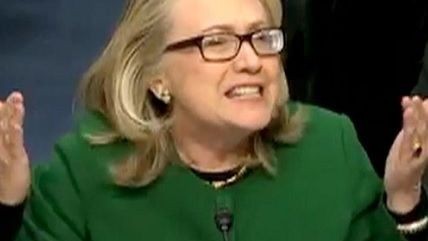When Will Hillary Clinton Answer For Her Iraq Vote?
What difference, at this point, does it make?

You can't be more straightforward: "Knowing what we know now, would you have authorized the invasion?" Fox News host Megyn Kelly asked presumptive GOP presidential candidate Jeb Bush about the Iraq War. Without hesitation, Bush replied: "I would have."
Bush went on to qualify his answer, adding that "so would have Hillary Clinton, just to remind everybody. And so would have almost everybody that was confronted with the intelligence they got."
Well, even if we give Bush the benefit of the doubt and concede that he was probably answering the question "Knowing what we knew then, would you have authorized the war?" rather than the one Kelly posed, it was still remarkably tone-deaf.
As a political matter, polls find that a large number of Americans (even many Republicans) believe Iraq wasn't worth the price. And considering all the setbacks and lives lost during the campaign, voters deserve a more nuanced answer from a person vying to be commander in chief.
For many people, Bush's comments will be disqualifying because they see the war in Iraq as a disaster. Not necessarily a disaster that has anything to do with conspiratorial motivations liberals assign to the war—no cabal of neocon imperialists trading lives for oil or empire -- but a disaster when judged against the promises made by George W. Bush's administration. And it wasn't only about intelligence failures. Even setting aside the fact that we never found weapons of mass destruction, the war failed to create a self-sustaining, vibrant democracy in Iraq—or, for that matter, any genuine thirst for freedom elsewhere in the Muslim world.
But that's not exactly a difficult position for me—or others who supported the invasion in 2003—to take, certainly not after the benefit of more than a decade of reflection. So though Jeb should be held accountable for his obtuse position on Iraq, shouldn't the people who sanctioned and advocated the removal of the Baathist regime be the focus of similar condemnation?
In her book Hard Choices, Hillary Clinton, "apologized" (as the press put it at the time) for giving President Bush authorization to use force in Iraq, writing: "I thought I had acted in good faith and made the best decision I could with the information I had. And I wasn't alone in getting it wrong. But I still got it wrong."
In a 2006 interview on the Today show, Clinton answered the question Jeb was asked: "Obviously, if we knew then what we know now, there wouldn't have been a vote." Clinton went on to say, "I certainly wouldn't have voted that way."
When a policy fails or the public turns against it, admitting that you wouldn't vote for it doesn't exactly make you Dietrich Bonhoeffer. If you or I knew what we know now, then we'd be (almost) perfect. And apologies are not an exemption from accountability. The problem with Clinton's position is that none of us ever knows "what we know now" when we make decisions. Her job, then, was to challenge the executive branch and remain duly skeptical of its case—which she was not.
But even if we suspend our disbelief and believe that her initial vote wasn't driven by political expediency (remember that voters supported an invasion in big numbers) or that her so-called apology wasn't driven by political expediency (by the time she switched, a big majority of Democrats believed Iraq was a mistake), how does a voter know that Clinton won't make another mistake the next time she is faced with one of those hard choices? The Iraq War vote was the most consequential one Clinton made as a senator, and by her own admission, she failed. Isn't that the way voters judge candidates who run on their experience and wisdom? Everyone makes mistakes, but not everyone has to be president.
And Clinton wasn't just fooled by faulty or misleading intelligence or led astray by a dishonest administration. In her floor speech defending the vote to invade, she made a passionate case for intervention little different from the one the administration was making for the long-term prospects of the region.
Because economic turmoil ultimately defined the 2008 elections, we may forget that the most consequential distinction between Clinton and Barack Obama—other than raw political talent—was the war. In fact, Obama rose to prominence as an Iraq War critic in 2002. Though Clinton may not have lost the nomination directly over her vote authorizing war, it was the issue that propelled her opponent and the grass-roots hostility to her candidacy. Even knowing what they know now about Clinton, Democrats will have to forgive her because she's "apologized"—but mostly because they really have no choice. Yet it's worth remembering that if candidates were judged on their retroactive positions, they would all be perfect.
© Copyright 2015 by Creators Syndicate Inc.


Show Comments (67)